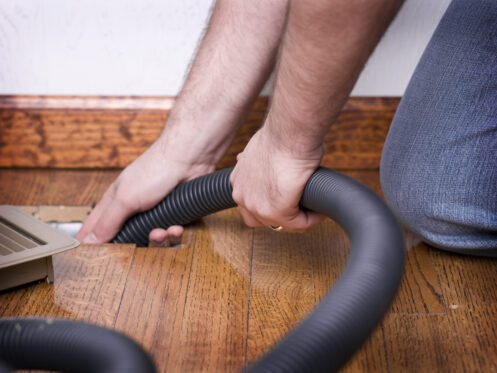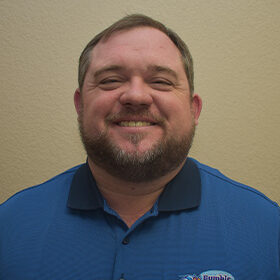Duct cleaning is a professional process through which your HVAC technician will remove all built-up dirt and debris from your ducts. Your technician will also trap all that dust and remove it entirely from your home. The National Air Duct Cleaners Association (NADCA) recommends scheduling an annual duct inspection during your spring or fall HVAC tune-up. The U.S. EPA recommends scheduling duct cleaning as needed. Let’s look at 10 reasons the pros recommend it.
1. Avoid Persistent Mustiness and Other Bad Odors
Ductwork is the number one source of foul odors in an HVAC system. If you’re dealing with persistent odors that you can’t shake no matter how much you dust, it may be your ducts. If you smell those odors whenever your cooling or heating kicks on, it’s your ducts. Dust alone can hold onto bad smells and continue releasing them over time. The problem can worsen with pests, mildew, or even mold in the ductwork.
2. Avoid Energy Loss Through Missing or Worn Insulation
Since a ductwork inspection isn’t part of a standard HVAC tune-up, many homeowners overlook it. That means that some potential issues can go unnoticed for a long time. One of them is insulation. Ducts that don’t have proper insulation can lose as much as 30% of the energy the system uses. That is a significant amount and a major hit to your wallet. There are three core issues: missing insulation, insulation that has worn out with time, and wet insulation. You should replace the insulation in all three cases as soon as possible.
3. Avoid Energy Loss Through Air Leakage
An HVAC technician can detect air leakage during a static air pressure test, a typical HVAC maintenance step. That said, your technician can get greater insight through a video camera inspection, a standard part of duct cleaning. Air leakage can result in a 20% loss of conditioned air. It happens because the seals between the duct sections break down over time. If your technician identifies this as a problem, aerosol-based duct cleaning is an EPA-recommended solution. Your HVAC company can seal your ducts in this manner after cleaning them.
4. Improve Indoor Air Quality
The EPA warns that indoor air pollution is among Americans’ top environmental health risks. There are a range of contributors to poor indoor air quality (IAQ), and dust in ducts is significant among them. Many people think of dust as nothing more than just dirt, but that isn’t accurate. Dust is a combination of many different pollutants and contaminants. That mixture acts like a sponge. It absorbs other pollutants, including gases and chemicals. It extends their effective lifespans and reemits them into your home over time. When you schedule duct cleaning, you eliminate all those toxins.
5. Minimize Asthma and Allergy Triggers and Symptoms
Many allergens are collected in your ducts. Those allergens can trigger attacks and heighten symptoms among people with asthma and bad allergies. Those allergens include pollen, mold spores, fungal spores, pet dander, and volatile organic compounds (VOCs). Cleaning your ducts can make a big difference for those suffering from respiratory ailments.
How often should you schedule duct cleaning if you have an allergy or asthma sufferer in the home? It depends. The NADCA recommends cleaning every other year or even annually if the ailment is particularly severe. Many allergists agree with this recommendation. Others do not, citing a lack of formal research. Ideally, you should speak with your allergist or doctor and get their advice. You may also want to look into HVAC filters for allergy and asthma sufferers.
6. Ensure There’s No Moisture and Microbial Growth
Ducts should generally be free of moisture. It usually happens due to a roof leak. If you have a leak, schedule a duct inspection after the repair. Moisture in ductwork is a big problem. The sooner you get to it, the cheaper and less hassle. One issue is that the moisture makes the dust and other accumulations much more challenging to remove. You also have to dry the ducts completely. The real danger if you miss the problem for an extended period is microbial growth. It can seriously affect IAQ in the home and even lead to your family getting sick.
7. Protect Your HVAC Equipment
Dust is a crucial contributor to the wear and tear of HVAC equipment. It shortens the evaporator coil lifespan and decreases coil performance. It causes issues with electrical components and mixes with lubricants to gunk up moving parts. Dust your home weekly. Schedule seasonal tune-ups and schedule duct cleaning at least every five years. That approach will help to extend the life of your HVAC equipment.
8. Optimize Heating and Cooling Efficiency
A primary reason seasonal maintenance is so essential is your evaporator coil. The dirtier a coil is, the less efficient it is. That increases your household’s carbon footprint. It also increases how much you pay each month in electricity costs. The burner and pilot light are considerations when it comes to gas furnaces as well. The dirtier they are, the more gas you’ll burn and the higher the carbon monoxide levels will potentially be.
9. Avoid Pest Infestations
Despite a common misconception, dust mites rarely live in ducts. It’s too dry for them. Cockroaches, on the other hand, have no problem nesting and otherwise thriving in ducts. You can even have mice or rats if the seals between your ducts are particularly damaged. A duct inspection will at least help you identify the problem. You can then take the necessary steps to correct it.
10. Extend the Life of Your HVAC Filters
The EPA recommends using the highest-rated filter that your HVAC system supports. In this context, the rating the EPA refers to is the minimum efficiency reporting value (MERV). The typical modern HVAC system can support a MERV-13 filter. Despite that, many homeowners use a MERV-8 or less. A higher MERV will keep your ducts and other HVAC equipment cleaner and improve IAQ.
The downside to using a MERV-13 or better filter is that it is more expensive. That extra cost can really add up if you have to replace your filter every month rather than every three months. There are two main ways to slow the rate of clogging: deep dust your home at least once a week and schedule duct cleaning on a regular basis.
Local Duct Cleaning Pros in Las Vegas
If you need duct cleaning in Las Vegas, Bumble Breeze is the HVAC contractor you can trust. We also have IAQ experts who provide whole-home sanitation services and install whole-house fans, air purifiers, dehumidifiers, and humidifiers. Our HVAC technicians install thermostats, electric and gas furnaces, ductless mini-splits, air conditioners, heat pumps, boilers, and radiant heating.
We also have plumbers who install, repair, and maintain pipes and repipe gas and water lines, central water supply, and sewer lines. You can also count on us for leak detection, water testing, filtration, sump pumps, drain cleaning, and hydro jetting. Call us today or contact us online to learn more or to schedule a consultation or service appointment.


